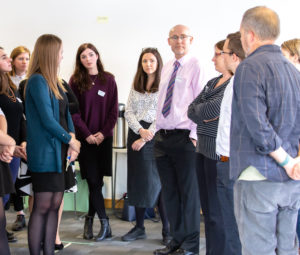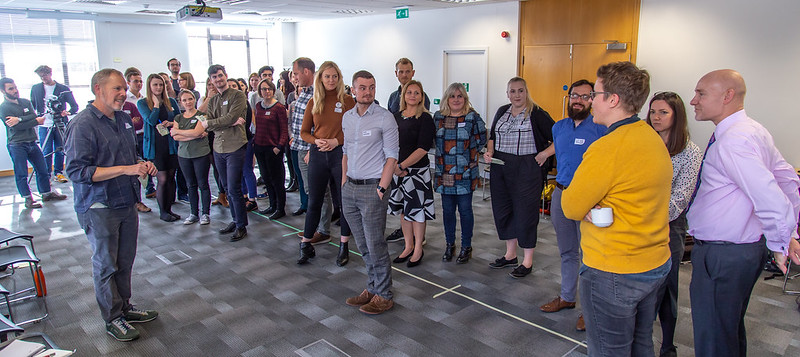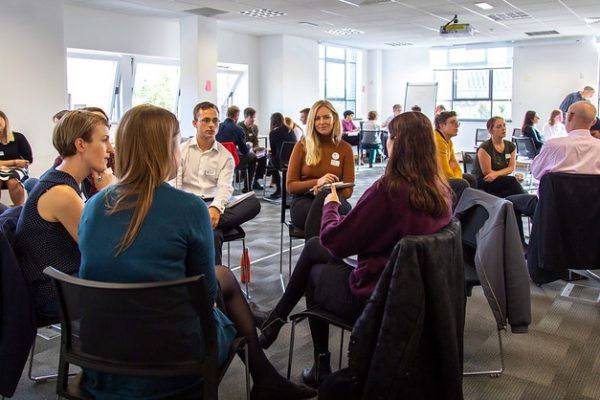Grantmaking data champions unite!
We are soon to launch a Data Champions programme [update: now launched] to connect and support people who are interested in helping their foundations to be more data-informed. Here, the programme facilitator Dirk Slater shares what happened at a recent taster workshop, bringing together grantmakers from across the UK for peer-learning, discussion and cake
Data literacy is a critical element of 360Giving’s vision for UK grantmaking to be more informed, effective and strategic. In addition to supporting organisations to publish their grants data openly, we also help people to use the data to in their day to day work and as part of their wider decision-making and learning.
 What is the Data Champions programme?
What is the Data Champions programme?
Our Data Champions programme is for people from independent grantmaking organisations that share their data to the 360Giving Data Standard.
The programme aims to help managers develop a data culture within their grantmaking organisations, with a mixture of face-to-face workshops and online discussions based on topics that the participants want to explore. Through this programme, we want to create a community for knowledge sharing, connecting and collaboration around data use.
What has shaped the programme?
We are shaping the programme around insights we learned during a data journey programme and a pilot project that we ran in partnership with UK Community Foundations (UKCF). One of the key lessons from the pilot was that the peer-learning basis of the programme is unusual and beneficial.
To give potential participants of the Data Champions programme a taste of the sort of peer-learning that we enable, we held an introductory workshop on 9 October 2019 which was focused on peer-exchange. It took place in London and we had nearly 40 people attended from a wide range of grantmaking organisations.
What happened at the workshop?
We started out in pairs, sharing our motivations for working at the crossroads of grantmaking and data.
We then used a group discussion exercise technique called ‘Spectrogram’. One end of the tape is marked as “strongly agree” and the opposite as “strongly disagree”. Participants stand where they feel along the line in response to certain statements. We asked participants to create controversial statements about data and grantmaking in groups, before reading them out for everyone to respond to on the Spectrogram, one by one.

The controversial statements were:
- Quantitative data is more valuable/useful that qualitative data
- More data is better than less data
- Data on declined applicants should be shared openly
- Decisions drive data (not the other way around)
- Small grants do more harm than good
- Grantees should be able to change their data whenever they want
- All grants data should be legally required to be open
- Data should be used to analyse need prior to making grant decisions
We explored each of them together, with a lively exchange.
Next up, six experts in the group each hosted a table in a world cafe format, bringing topics and expertise that participants might encounter in the Data Champions programme.
- Ethny Childs talked about the analysis she did as part of Dunhill Medical Trust’s review of their funding strategy. You can read more about that here.
- David Kane presented the 360Insights platform. If you want to find out more about the platform, contact David.
- Dan Kwiatkowski presented Charity Base, a database, API and web app providing public information on activities, locations and finances of the 168,000 charities registered in England and Wales.
- Steven Mackenzie from Essex Community Foundation talked about his journey with data and grantmaking analysis.
- Nicola Frost from Devon Community Foundation talked about how they are harmonising qualitative and quantitative data in the foundation.
- Patrick O’Kelly talked about creating his first data visualisation which helped to map out and understand Clothworkers’ grants and deprivation data, using the Flourish visualisation tool.
Data utopias and dystopias

After a break, participants chatted in small groups about their visions of what data utopias or data dystopias would look like. To help, we supplied paper and coloured pens. Common themes were about interlinkages of learning and knowledge, and integration of data in programme cycles, and layers (of cake!).
We ended by asking the participants to share questions they would want to address if they took part in the Data Champions programme. We will refer to these questions as we continue to design the new programmes. Here’s a selection of the 40 questions raised:
- How does data lead to behaviour change?
- How to measure impact (not money awarded)?
- How can we get help connecting different types of data software?
- How do we stop data from being overwhelming?
- How are other people using data?
- What are the biggest data challenges facing trusts and foundations?
- What techniques are there to make sure data is accurate?
- How to use datasets to answer questions both in a micro and macro environment?
- Is it possible to visualise impact?
- How do we prioritise data to collect? And what kinds of analysis should we prioritise?
- How can we get inspiration and ideas about what we can/should do with data?
- How can we collect qualitative data?
- How to communicate the importance of data internally?
- What does good data look like?
- What are the best ways to encourage collaboration?
- What questions can we ask each year, and how can they support our decision making?
The taster workshop showed how much appetite there is amongst grantmakers to share knowledge and experience with each other, and learn how to use data better and be more data-informed.
Peer-learning is core to the Data Champions programme, alongside the more technical support we give to participants to bring about a data culture in their organisations.
If you work for a grantmaker, publish to the 360Giving Data Standard and would like to be involved in the new Data Champions programme, great! Keep an eye out on the 360Giving website or Twitter feed for the call for applications, to be announced this month.
